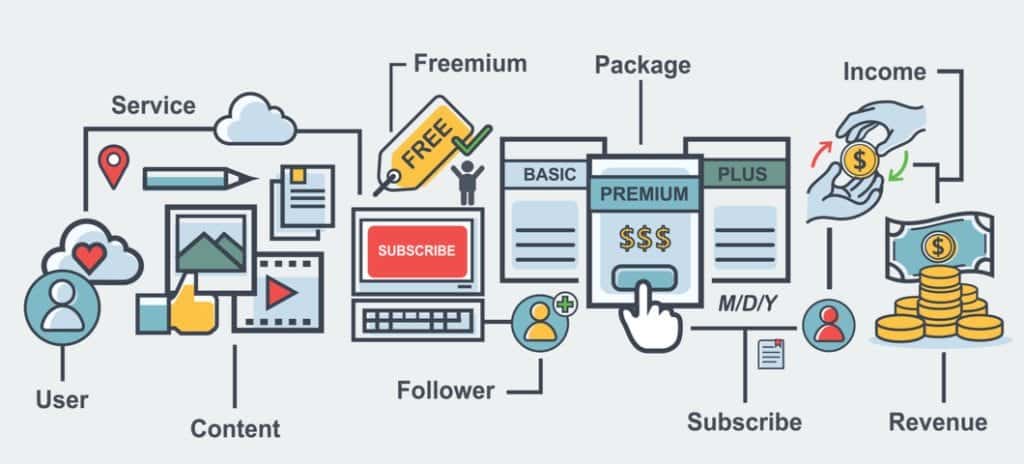The strategic implementation of subscription models within niche markets has been instrumental in reshaping the landscape of ecommerce. By offering tailored products and services, businesses can secure a steady revenue flow while fostering unwavering customer loyalty. The allure of subscription-based business models lies in their ability to cater to the specific needs of discerning consumer segments, providing a personalized experience that traditional retail cannot replicate. As we delve further into the intricacies of these models, a deeper understanding emerges of the strategic advantages that underpin their success, hinting at a compelling narrative that sheds light on the dynamic interplay between niche markets and subscription-based strategies.
Understanding Subscription Ecommerce in Niche Markets
The subscription economy has experienced significant growth, reshaping how businesses interact with consumers and fostering stronger brand loyalty. In niche markets, the appeal of subscription models lies in their ability to cater directly to the unique preferences and demands of a specialized audience. Understanding the rise of subscription-based ecommerce and the key characteristics of successful models is essential for businesses looking to thrive in these targeted segments.

The Rise of the Subscription Economy
Amidst the evolving landscape of ecommerce, subscription models have emerged as a pivotal strategy for businesses operating in niche markets. This shift towards subscription-based ecommerce reflects the strategic adaptation of companies aiming for sustainability and growth in a competitive digital economy. To understand the rise of the subscription economy better, consider the following:
- Direct Customer Engagement: Subscription models enable businesses to engage directly with their customers, fostering long-term relationships and brand loyalty.
- Predictable Revenue Streams: By offering subscription services, businesses can establish predictable revenue streams, providing financial stability and facilitating better financial planning.
- Tailored Offerings: Subscription models allow companies to tailor their products or services to meet the specific needs and preferences of their niche market audience, enhancing customer satisfaction and retention.
Key Characteristics of Successful Subscription Models
Successful subscription models in niche markets are characterized by a deep understanding of the factors that drive ecommerce growth strategy. Adapting ecommerce strategies to align with subscription success requires a keen focus on meeting the specific needs and preferences of a targeted audience, ultimately fostering long-term customer relationships. By honing in on these key characteristics, businesses can effectively navigate the competitive digital landscape and create sustainable value for both the company and its customers.
Factors Driving Ecommerce Growth Strategy
In the realm of niche markets, understanding the key characteristics of successful subscription models is essential for driving ecommerce growth strategy.
- Personalization: Tailoring offerings to meet specific needs enhances customer engagement.
- Predictable Revenue: Subscription models provide a steady income stream, aiding in financial planning.
- Customer Retention: Building long-term relationships fosters loyalty and sustains business growth.
Key Factors Driving Subscription Ecommerce Growth
| Factor | Description | Importance Rating (1-5) |
|---|---|---|
| Customer Retention Strategies | Techniques used to keep customers subscribed, such as loyalty rewards and personalized content. | 5 |
| Pricing Flexibility | Ability to offer various pricing tiers and promotions to meet diverse customer needs. | 4 |
| Technological Integration | Utilization of advanced tech to manage subscriptions, improve user experience, and scale. | 5 |
| Market Adaptability | Responsiveness to changing market trends and customer preferences. | 4 |
| Regulatory Compliance | Adherence to legal standards and privacy regulations affecting subscription services. | 3 |
Adapting Ecommerce Strategies for Subscription Success
What strategies can businesses employ to effectively adapt their ecommerce approach for successful subscription models in niche markets? Businesses should focus on personalization, offering tailored subscription options that cater to the unique needs and preferences of their niche audience. Additionally, providing flexibility in subscription plans, ensuring seamless user experience, and continuously analyzing data to refine offerings are crucial for sustaining and growing subscription-based ecommerce success in niche markets.
How Subscription Models Enhance Ecommerce Strategy
The integration of subscription features into traditional ecommerce practices can significantly enhance a company’s overall strategy, providing opportunities to build recurring revenue streams and deepen customer engagement. Understanding the nuances of subscription e-commerce platforms is crucial for businesses seeking to leverage these models effectively in niche markets to drive growth and foster long-term customer relationships. By carefully considering the implications and intricacies of subscription-based strategies, companies can position themselves strategically in the competitive digital landscape, offering tailored solutions that resonate with their target audience.
Integrating Subscription Features into Traditional Ecommerce
Leveraging subscription features within traditional ecommerce platforms presents businesses with a strategic advantage, enabling them to enhance their ecommerce strategy and cultivate long-term customer relationships.
- Recurring Revenue: Implementing subscription models allows for predictable revenue streams, providing stability and financial security for the business.
- Customer Loyalty: By offering subscription options, businesses can foster long-lasting relationships with customers, leading to higher retention rates and increased customer lifetime value.
- Personalization: Subscription features enable businesses to tailor products and services to individual customer preferences, enhancing the overall shopping experience and driving customer satisfaction.
Subscription Ecommerce Platforms: What You Need to Know
Subscription features within traditional ecommerce platforms not only provide businesses with a means to establish recurring revenue and foster customer loyalty but also serve as a fundamental component in enhancing the overall ecommerce strategy. By incorporating subscription models into their ecommerce platforms, businesses can create a predictable revenue stream, increase customer lifetime value, and drive repeat purchases. These platforms offer flexibility in subscription plans, personalized experiences, and automated processes, ultimately improving customer retention and satisfaction. Additionally, subscription e-commerce platforms enable businesses to gather valuable customer data, analyze purchasing patterns, and tailor offerings to meet specific customer needs. Embracing subscription models within ecommerce strategies can lead to sustainable growth, increased competitiveness, and enhanced customer relationships in today’s dynamic digital landscape.

Exploring Innovative Subscription Business Ideas
Innovative subscription business ideas are key to success in niche markets, where creativity and customization play vital roles. Businesses that tailor their subscription offerings to the specific needs and preferences of their target audiences can establish a strong competitive edge. By exploring unique subscription models and customizing offerings, companies can build lasting relationships with customers and drive sustained growth in niche markets.
Creative Subscription Models for Niche Markets
Exploring novel approaches to subscription-based business models tailored for niche markets can unveil unique opportunities for sustained growth and enhanced customer engagement. When it comes to creative subscription models in niche markets, businesses can consider:
- Tiered Subscription Plans: Offering different levels of subscription with varying features and benefits can cater to diverse customer needs and budgets, creating a personalized experience for each subscriber.
- Limited Edition or Exclusive Products: Providing subscribers with access to limited edition or exclusive products can drive excitement and loyalty, making the subscription offering more desirable and unique.
- Collaborations and Partnerships: Collaborating with other businesses or influencers to create special subscription packages can attract new customers and expand the reach of the niche market subscription service.
Customizing Subscriptions for Target Audiences
Tailoring subscription offerings to meet the specific needs and preferences of target audiences is a strategic approach that can enhance customer engagement and long-term loyalty in niche markets. By customizing subscriptions, businesses can create personalized experiences that resonate with their customers, fostering a deeper connection and sense of value. This customization can range from offering exclusive products or services to providing flexible subscription plans that cater to individual preferences. Understanding the unique characteristics and desires of their target audience allows companies to refine their offerings and optimize customer satisfaction. Through this tailored approach, businesses can differentiate themselves in the market and build a loyal customer base that is more likely to continue their subscriptions over time.
| Personalized Experiences | Exclusive Offers | Flexibility in Subscription Plans |
|---|---|---|
| Tailored product selections based on customer preferences | Access to limited edition items or early releases | Ability to customize subscription frequency and content |
| Enhanced customer engagement | VIP perks and discounts | Options to pause, skip, or modify subscriptions |
| Increased customer loyalty | Special promotions and events | Multiple subscription tiers to choose from |
The Technical Backbone: Subscription Ecommerce Platforms
Subscription e-commerce platforms serve as the foundation for successful subscription-based businesses, requiring careful consideration when selecting the right platform for managing subscriptions. Building scalable systems is crucial for accommodating the growth and evolving needs of subscription services, ensuring a seamless and efficient customer experience. The technical backbone of subscription e-commerce platforms plays a critical role in supporting the operational aspects of subscription models in niche markets.
Choosing the Right Platform for Subscription Management
Selecting the appropriate platform for subscription management is a critical decision for businesses operating in niche markets, as it serves as the technical backbone supporting the seamless operation of subscription e-commerce platforms. When choosing the right platform, consider the following:
- Scalability: Ensure the platform can handle growth and increased demand without compromising performance or customer experience.
- Integration Capabilities: Look for a platform that seamlessly integrates with other essential systems such as CRM software and marketing tools.
- Customization Options: Opt for a platform that allows for customization to tailor the subscription experience to the unique needs and preferences of your niche market.
Building Scalable Systems for Subscription Services
To ensure the seamless operation and scalability of subscription services in niche markets, businesses must focus on establishing robust technical foundations through the implementation of effective subscription e-commerce platforms. These platforms serve as the backbone of subscription-based businesses, facilitating recurring billing, customer management, and automated workflows. By leveraging advanced features such as customizable subscription plans, flexible billing cycles, and seamless integration with other systems, businesses can streamline operations and enhance the overall customer experience. Additionally, subscription e-commerce platforms offer valuable insights through data analytics and reporting tools, enabling businesses to make informed decisions and optimize their subscription offerings. Investing in a reliable and scalable platform is crucial for sustaining growth and meeting the evolving needs of niche market customers.

Analyzing Subscription Model Examples Across Industries
Exemplifying the diversification of revenue streams, various industries have successfully implemented subscription models to bolster customer engagement and loyalty. These examples showcase the versatility and effectiveness of subscription models in different sectors:
- Media and Entertainment: Streaming services like Netflix and Spotify have capitalized on subscription models to provide users with access to a wide range of content for a monthly fee. This approach not only ensures a steady stream of revenue but also encourages customer retention through personalized recommendations and exclusive content.
- Beauty and Wellness: Subscription boxes offered by companies such as Birchbox and FabFitFun have transformed the way consumers discover and purchase beauty and wellness products. By curating personalized boxes tailored to individual preferences, these businesses enhance the overall customer experience and foster brand loyalty.
- Software as a Service (SaaS): Companies like Adobe and Microsoft have embraced subscription-based models for their software products, moving away from one-time purchases. This shift allows for continuous updates, improved customer support, and a more predictable revenue stream, while also adapting to the evolving needs of businesses and individual users.
Comparison of Subscription Model Examples Across Industries
| Industry | Subscription Model | Key Benefits | Target Audience |
|---|---|---|---|
| Health & Wellness | Monthly Wellness Boxes | Personalized health products | Health-conscious consumers |
| Fashion & Beauty | Quarterly Style Boxes | Customized fashion selections | Fashion enthusiasts |
| Food & Beverages | Weekly Meal Kits | Convenient, healthy meal options | Busy professionals |
| Entertainment | Streaming Services | Unlimited content access | Movie and TV show lovers |
| Technology | Software as a Service | Regular updates, scalable solutions | Tech companies, IT professionals |
Optimizing Customer Retention in Subscription Ecommerce
Enhancing customer retention strategies in subscription e-commerce is pivotal for ensuring long-term viability and sustained growth in niche markets. Customer retention goes beyond acquiring new subscribers; it focuses on nurturing existing relationships to foster loyalty and maximize customer lifetime value. To optimize customer retention in subscription-based ecommerce, businesses can implement personalized communication strategies, such as targeted emails based on customer preferences and behaviors. By providing tailored recommendations and exclusive offers, companies can enhance the overall customer experience and increase engagement.
Furthermore, offering flexible subscription options can also contribute to improved customer retention. Allowing subscribers to easily modify their subscription plans based on their evolving needs can help prevent churn and promote long-term commitment. Additionally, proactive customer service and timely responses to inquiries or concerns are essential for building trust and loyalty among subscribers.
Moreover, leveraging data analytics to gain insights into customer behavior and preferences can enable businesses to anticipate needs and deliver personalized experiences effectively. By continuously analyzing customer data, businesses can refine their subscription offerings, tailor marketing campaigns, and implement targeted retention strategies.
Ultimately, prioritizing customer retention in subscription e-commerce not only strengthens customer relationships but also drives sustainable growth and profitability in niche markets. By focusing on enhancing the overall subscriber experience and implementing strategic retention initiatives, businesses can differentiate themselves in a competitive landscape and create a loyal customer base that sustains long-term success.
Pricing Strategies for Subscription-Based Services
When it comes to subscription-based services, pricing strategies play a pivotal role in attracting and retaining customers. Setting competitive subscription rates ensures that the service remains appealing and competitive in the market. Additionally, implementing dynamic pricing models can help businesses adjust prices based on demand and customer behavior, optimizing revenue generation.
Setting Competitive Subscription Rates
The establishment of competitive subscription rates is a critical component in developing effective pricing strategies for subscription-based services in niche markets. When setting competitive subscription rates, businesses should consider:
- Market Analysis: Conduct thorough research to understand competitors’ pricing structures and the value they offer to customers.
- Value Proposition: Clearly communicate the unique value proposition of the subscription service to justify the pricing and differentiate it from competitors.
- Customer Feedback: Gather feedback from existing and potential customers to gauge their willingness to pay for the service and adjust pricing accordingly.
Dynamic Pricing Models for Subscription Services
In the realm of subscription-based services in niche markets, the implementation of dynamic pricing models plays a pivotal role in shaping effective pricing strategies. Dynamic pricing allows businesses to adjust subscription rates based on various factors such as demand, customer behavior, and market conditions. By utilizing this flexible pricing approach, companies can optimize revenue by offering personalized pricing plans that cater to individual customer segments. This dynamic strategy not only enhances customer satisfaction by providing tailored pricing options but also enables businesses to remain competitive and adaptive in a rapidly changing market environment. Through the continuous analysis of data and consumer trends, companies can fine-tune their pricing strategies, maximizing profitability while meeting the evolving needs of their niche market audience.
Happy Digital’s Challenges and Solutions in Subscription Ecommerce
Happy Digital faces challenges in managing subscriptions efficiently and providing a seamless experience for its customers. By addressing common obstacles in subscription management and leveraging technology solutions, Happy Digital can enhance its subscription operations and ensure customer satisfaction. Implementing effective strategies to streamline subscription processes is key to overcoming hurdles and optimizing the subscription ecommerce experience for both the company and its clientele.
Overcoming Common Obstacles in Subscription Management
Navigating the intricate landscape of subscription management poses various challenges for businesses, requiring strategic solutions to ensure operational efficiency and customer satisfaction in the realm of subscription ecommerce.
- Churn Management: Implement strategies to reduce customer churn by analyzing reasons for cancellations and proactively addressing them through targeted retention efforts.
- Billing and Payment Issues: Streamline billing processes and enhance payment options to minimize errors, improve cash flow, and enhance the overall customer experience.
- Customer Communication: Develop personalized communication strategies to engage customers effectively, provide relevant updates, and gather feedback to continuously improve subscription services.

Technology Solutions for Seamless Subscription Operations
To optimize subscription operations and address challenges in subscription management, businesses in niche markets are increasingly turning to technology solutions for streamlining processes and enhancing customer experiences. Happy Digital, a prominent player in the subscription e-commerce industry, faced various challenges in managing recurring payments, customer data security, and personalized customer interactions. To overcome these hurdles, Happy Digital implemented an advanced subscription management platform that automates billing cycles, integrates with customer relationship management systems, and offers personalized subscription recommendations based on user behavior. By leveraging technology solutions, Happy Digital not only improved operational efficiency but also enhanced customer satisfaction, leading to increased retention rates and sustainable business growth in the competitive niche market landscape.
The Future of Subscription Models in Ecommerce
Amidst the evolving landscape of ecommerce, the trajectory of subscription models in niche markets continues to shape the future of customer engagement and business sustainability. As businesses navigate this dynamic environment, several key trends are likely to influence the direction of subscription models in ecommerce:
- Personalization: The future of subscription models in ecommerce will be increasingly tailored to individual customer preferences. By leveraging data analytics and AI technologies, businesses can offer personalized product recommendations, content, and experiences, enhancing customer satisfaction and loyalty.
- Flexibility and Convenience: Ecommerce subscription models will evolve to provide greater flexibility and convenience for customers. This may include customizable subscription plans, on-demand services, and seamless omnichannel experiences to meet the diverse needs of modern consumers.
- Sustainability and Ethical Practices: With growing concerns about environmental sustainability and ethical business practices, the future of subscription models in ecommerce will likely prioritize transparency, eco-friendly initiatives, and social responsibility. Businesses that align their subscription offerings with sustainable values are poised to attract a conscientious consumer base and drive long-term success.
Legal and Regulatory Considerations in Subscription Ecommerce
Legal compliance is a critical aspect that businesses operating subscription ecommerce models must meticulously address to ensure adherence to regulatory requirements and consumer protection laws. Subscription-based businesses need to consider various legal and regulatory considerations to operate ethically and avoid potential pitfalls. One key area of focus is data privacy and security, especially with the collection and storage of customer information for recurring transactions. Ensuring compliance with data protection laws, such as the General Data Protection Regulation (GDPR) in Europe or the California Consumer Privacy Act (CCPA) in the United States, is paramount to maintaining trust with subscribers.
Additionally, businesses must clearly outline their terms and conditions, including billing practices, cancellation policies, and subscription renewals, to prevent misunderstandings and potential disputes. Transparent communication regarding pricing, automatic renewals, and any additional fees is essential to avoid accusations of deceptive practices. Moreover, subscription businesses should be aware of regulations related to automatic renewals and provide subscribers with easily accessible options to manage their subscriptions.
Comprehensive Software Development Solutions
Unlock the potential of digital transformation with our bespoke software development services, engineered to foster innovation, maximize efficiency, and catalyze business growth.
Conclusion
In conclusion, the success of subscription models in niche markets is driven by their ability to provide tailored products and services to meet specific consumer demands, leading to increased customer loyalty and revenue streams for businesses. By understanding the strategic advantages and technical aspects of subscription ecommerce, companies can create innovative business ideas and pricing strategies that foster growth and customer engagement. The future of subscription models in ecommerce will continue to evolve, guided by legal and regulatory considerations to ensure sustainable business practices.
How Do Subscription Models in Niche Markets Affect Customer Engagement and Brand Loyalty?
Subscription models in niche markets enhance customer engagement and brand loyalty by offering tailored solutions to specific needs. They create a personalized experience, fostering stronger connections between businesses and customers, ultimately leading to increased loyalty and long-term relationships.
What Are Some Unique Challenges That Niche Market Businesses Face When Implementing Subscription Models?
Implementing subscription models in niche markets poses unique challenges such as identifying the right target audience, ensuring tailored offerings, managing inventory for specialized products, and maintaining customer engagement. Overcoming these hurdles requires a deep understanding of niche market dynamics and consumer preferences.
How Can Businesses Effectively Measure the Success and ROI of Their Subscription-Based Ecommerce Strategies in Niche Markets?
Businesses can effectively measure the success and ROI of their subscription-based ecommerce strategies in niche markets by tracking key metrics such as customer retention rates, average revenue per user, acquisition costs, and lifetime value. Analyzing these data points provides valuable insights for optimizing strategies and maximizing returns.
What Role Does Personalization Play in the Success of Subscription Models in Niche Markets?
Personalization is paramount in the success of subscription models in niche markets. Tailoring offerings to specific customer preferences fosters loyalty and satisfaction. By customizing experiences, businesses can create value, drive engagement, and differentiate themselves in competitive landscapes, ultimately leading to sustainable growth.



